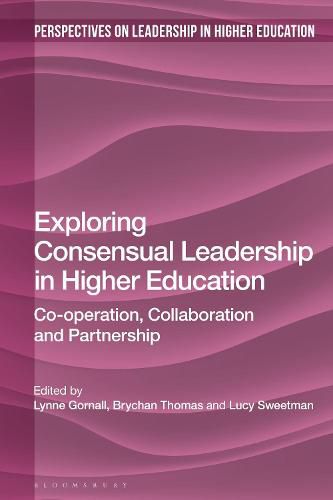Readings Newsletter
Become a Readings Member to make your shopping experience even easier.
Sign in or sign up for free!
You’re not far away from qualifying for FREE standard shipping within Australia
You’ve qualified for FREE standard shipping within Australia
The cart is loading…






Exploring Consensual Leadership in Higher Education explores the idea that the nature of academic work is both creative and consensual. Higher education relationships, whether between managers, staff, learners or the public sphere, are at their most effective when rooted in partnership, teamwork, collaboration and collegiality. The term ‘consensual’ is used because it situates new leadership models as structures based on consent, reflecting tacit traditions in education alongside ideas of leadership in other settings, including emerging industries. The aim is to celebrate achievements, encourage engagement opportunities, and add to the problem-solving knowledge-base. However, issues and problems in participatory engagement are also considered, and the borderlines between consensus (collective assent and agreement) and ‘dissensus’ (widespread, serious, disagreement) are examined critically.
The contributors offer a range of alternative perspectives on leadership, reflecting the diverse forms and ways of working practised in different national higher educational contexts and cultural settings. The volume incorporates a variety of approaches and points of view, including stories of leadership and change, innovation projects and case studies, key interviews and insights, and collective team writing.
$9.00 standard shipping within Australia
FREE standard shipping within Australia for orders over $100.00
Express & International shipping calculated at checkout
Exploring Consensual Leadership in Higher Education explores the idea that the nature of academic work is both creative and consensual. Higher education relationships, whether between managers, staff, learners or the public sphere, are at their most effective when rooted in partnership, teamwork, collaboration and collegiality. The term ‘consensual’ is used because it situates new leadership models as structures based on consent, reflecting tacit traditions in education alongside ideas of leadership in other settings, including emerging industries. The aim is to celebrate achievements, encourage engagement opportunities, and add to the problem-solving knowledge-base. However, issues and problems in participatory engagement are also considered, and the borderlines between consensus (collective assent and agreement) and ‘dissensus’ (widespread, serious, disagreement) are examined critically.
The contributors offer a range of alternative perspectives on leadership, reflecting the diverse forms and ways of working practised in different national higher educational contexts and cultural settings. The volume incorporates a variety of approaches and points of view, including stories of leadership and change, innovation projects and case studies, key interviews and insights, and collective team writing.